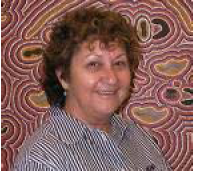Jeannie Herbert is an Aboriginal woman from the Kimberley in Western Australia and Director of the Batchelor Institute of Indigenous Tertiary Education in the Northern Territory of Australia. Here, she speaks about Aboriginal Pedagogy, describing some of the difficult dialogues around indigenous pedagogy.

Education is an wholistic process which is concerned with the overall needs of the individual as a member of the group. Educational needs are perceived as being linked to survival of both the individual and the group.
Self-determination lies at the heart of Aboriginal pedagogy. Aboriginal people do want to share their knowledges with other Australians. It is, however, critical to recognise that there is an expectation of reciprocity in such an activity. The sharing of knowledges should be to the mutual benefit of all concerned. Those knowledges that are secret and sacred must remain so.
Aboriginal people do want their young people to acquire those western knowledges and skills which will enable them to access and participate in the dominant culture on their own terms. It must be accepted, however, that this should not be at the cost of their own cultural identity. Cultural affirmation is a key factor in demonstrating to Aboriginal people that their cultures are valued within the dominant community.
Education is perceived as an area in which we can engage in discourse designed to explore the nature of the power relationships that exist in this country. The purpose of such dialogue would be to achieve a balance in the power structures that operate within our society. The centrality of identity and the importance of social relationships in establishing an individual’s ‘place’ are crucial aspects of Aboriginal pedagogy.
Education should be practice-based, explicitly examining and practically probing language, educational activities and social relationships as part of on-going course development. Contesting knowledges and the appropriateness of activities, etc should be an essential part of any education practice as it will ensure quality.
Educational programs should be a combination of theory and practice so that opportunities are provided to explore inter-relationships and the purpose of specific programs. For example, in teaching English, teachers should begin with accepting and demonstrating their valuing of the child s own language, so that forms the base from which teachers will be quite explicit about the purpose of the students learning the additional knowledge and skills in the English language.
So how critical is the need to position Aboriginal pedagogies within our existing education systems? … ‘[P]edagogy’ [is] the ‘science of teaching’. Analysing the statistical data available, it would seem that the evidence of the retention and success rates, across all sectors of education, suggests that we have not been effective in catering for the learning needs of Aboriginal and Torres Strait Islander students.
The non-involvement of Aboriginal and Torres Strait Islander parents in educational decision making, would seem to suggest that our education processes are not conducive to Indigenous self-determination. So what is the problem?
To me, it is obvious. We have no voice. We represent a silenced minority within the dominant culture. Such a situation will continue as long as we remain unheard. So, how will this change with the adoption of Aboriginal pedagogies, you might ask.
I believe it is a matter of ‘visibility’. That which is not seen, is not discussed, is not considered important …
The creation of generic documents which contain statements such as ‘Inclusivity means ensuring all groups of students are included and valued’ are a sign of the times and they indicate to me that ‘equity’ as a political issue, is no longer on the agenda. The danger with this is that, in a society where the education system has, as its main focus, the needs of the dominant culture, minority groups, such as Aboriginal peoples, tend to be overlooked. Seeing no visible commitment to their needs, they make the assumption they are not important and remain silenced. But will the inclusion of an Aboriginal pedagogy change this? …
Bringing Indigenous and non-indigenous peoples together to engage in face-to-face communication in order to explore the important discourses, is the only way I can perceive that non-Aboriginal people will begin to understand the value of making Aboriginal pedagogies an integral part of the learning programs in all of our educational institutions—from pre-school through to the tertiary sector. If you were to do this, the total project would be developed and managed by a project team consisting of both Indigenous and non-Indigenous educators.
The critical factor in establishing the program would be the building of a reciprocal relationship between all members of the cross-cultural team. In such a way we would build in respect for one another and our differences as a first step in ensuring that non-Aboriginal people understand that they cannot speak for us as Aboriginal people, because they have not come from our position within this society.
While I strongly support the notion that non-Aboriginal people cannot speak for us, I must state that this is not meant to silence them on Aboriginal issues. One of the things I stress with my staff is that, if they choose to work with Indigenous peoples then they should not abrogate their responsibility to talk about Indigenous issues, to support us, particularly in the professional sphere. What they cannot do is to speak in a way that implies they are representing our views. They must speak from their perspective as non-Aboriginal people working with Aboriginal people.
Herbert, Jeannie. 1998. ‘Making the Links.’ in Making the Links: Aboriginal Pedagogy Conference: Department of Education, Western Australia.
